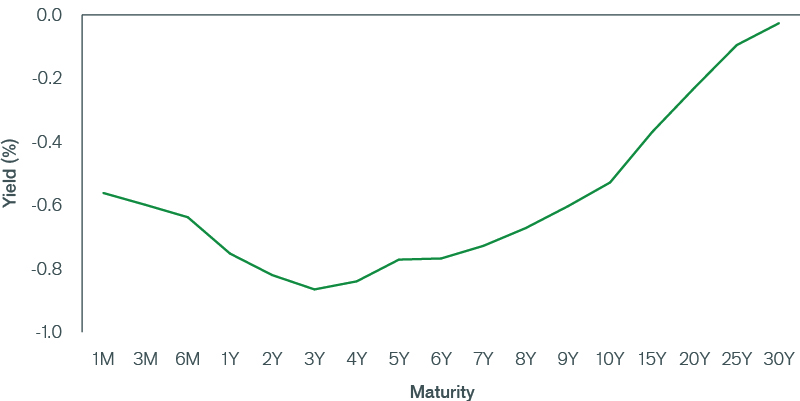Subscribe
Sign up for timely perspectives delivered to your inbox.
A colleague has an old Barron’s cartoon hanging in his office showing two large people, both smoking and one holding a “mondo cola.” The caption reads, “This whole damn health-care system is a mess.” In “Mistakes Were Made (but not by me),” social psychologists Carol Tavris and Elliot Aronson outline the theory of cognitive dissonance and the many aspects of life in which it applies, including politics, law and marriage. Holding two ideas that are psychologically inconsistent produces mental discomfort and will motivate a person to find a way to reduce the dissonance, typically in a self-justifying manner.1
A casual reading of today’s headlines makes clear that many market participants are worried. Slowing global growth, trade wars and political tensions are a few of the key concerns set against the backdrop of an aging bull market and economic expansion. Bond yields have been dropping dramatically since late 2018. Globally, $15 trillion of sovereign debt yields less than zero, and recently the entire German government bond yield curve went negative. The threat of recession and the related desire for “safety” seem to loom large on the minds of many investors.

Source: Bloomberg, as of 8/6/19. *Willem Buiter, Special Economic Adviser at Citi, referred to current global monetary policy as a “land of make believe” in a “Bloomberg Surveillance” interview on 7/12/19.
In this context, growth stocks have surged: Tech stocks are up more than 124% over the past five years, double the next best-performing sector and nearly triple the gain of the broader MSCI World IndexSM.2 There has also been a bull market in stocks of companies with perceived stability. The price-to-earnings premium of the MSCI World Minimum Volatility Index over the broader benchmark has expanded to 4.0 multiple points from 0.3 points five years ago. Many investors seem to harbor the thought that if they can be sure of some amount of growth, or even just stability, then their portfolios will be able to weather any economic turbulence.
Growth and stability at any price? GASP?! Not another acronym, please. As the excitement builds in these hot areas of the stock market, investors would do well to remember the experience of the 1970s. Analysts at Exane BNP Paribas note that from their peak in early 1973, the Nifty Fifty underperformed the S&P 500® Index by 48% through the end of the decade, even though earnings-per-share growth for the Nifty Fifty was far higher than that of the broader market index over that span. High valuations act as a weight, depressing forward returns even when fundamentals are strong. Watch out below should the perceived growth/stability of earnings for high-flying stocks not materialize.
High valuations act as a weight, depressing forward returns even when fundamentals are strong. Watch out below should the perceived growth/stability of earnings for high-flying stocks not materialize.”
On the other hand, investors are deeply skeptical of value/cyclical stocks. The Global Financial Crisis of 2007-2009 was formative for many who experienced it, animating thoughts of what could go wrong today. This seems particularly true when assessing the prospects of companies that fared particularly poorly during the crisis, such as banks, autos, etc. Meanwhile, a generation of younger market participants is learning to loathe value investing. Value stocks as measured by price-to-book ratio trailed growth by 5.5 percentage points a year from April 2007 through May 2019, their worst showing in 80 years, according to data compiled by Dartmouth professor Kenneth French.3
The stark divergence between growth/stable stocks and value/cyclicals may be best understood as a matter of investors’ cognitive dissonance about which type of equities are likely to outperform in a recession. It is proving difficult for many to simultaneously consider (1) a recession is looming, and (2) I’m going to own value/cyclical stocks. Instead, investors seem to feel much more comfortable pairing a portfolio of growth/stable stocks with their worried economic/market outlook.
All of which provides a narrow though potentially attractive opportunity. The economy may, in fact, continue to weaken from its strong showing in 2018 and could even tip into recession. There are good reasons to worry about how such a scenario would unfold, given already-stretched monetary policy from the world’s main central banks. Still, the fear seems overdone, in our view. Our analysts and portfolio managers are researching value/cyclicals which, in addition to having inordinately cheap valuations, are also financially well capitalized and competitively likely to endure. Valuations that imply improbably weak outcomes, all relevant factors considered, tilt the odds in buyers’ favor. For example, many U.S. banks offer double-digit shareholder returns when combining dividends and buybacks. Small-cap stocks provide more opportunity than large caps, and value opportunities are increasingly plentiful outside the U.S., in our view. Thinking a bit longer term, should the economy rebound, these companies could see tremendous earnings growth upside and, eventually, multiple expansion.
We think giving careful consideration to the “other side of the trade” is a crucial component to successful investing. Going beyond the fundamentals to gain a broader understanding of the circumstances driving stock prices may help a discerning investor identify favorable reward-to-risk opportunities. Focusing where others feel discomfort is a good place to start.
Thank you for your co-investment with Perkins Investment Management.
Gregory Kolb